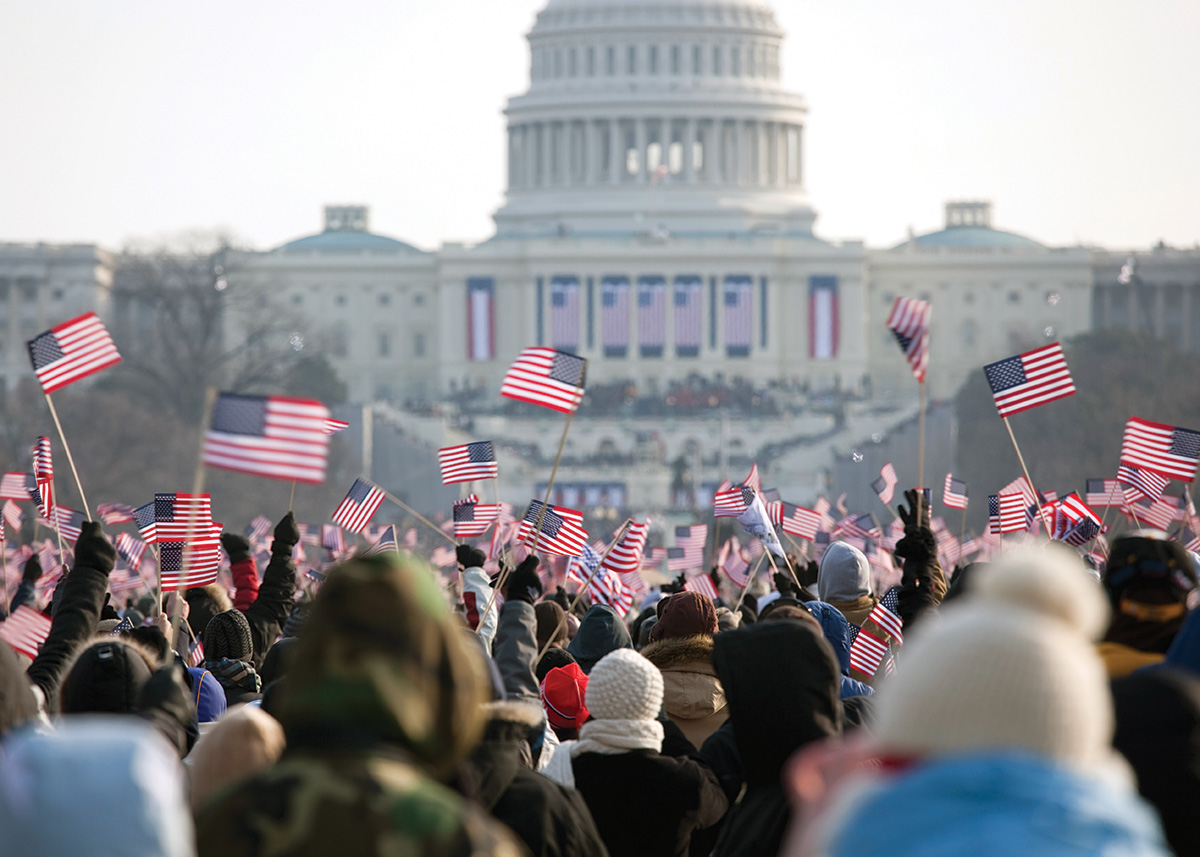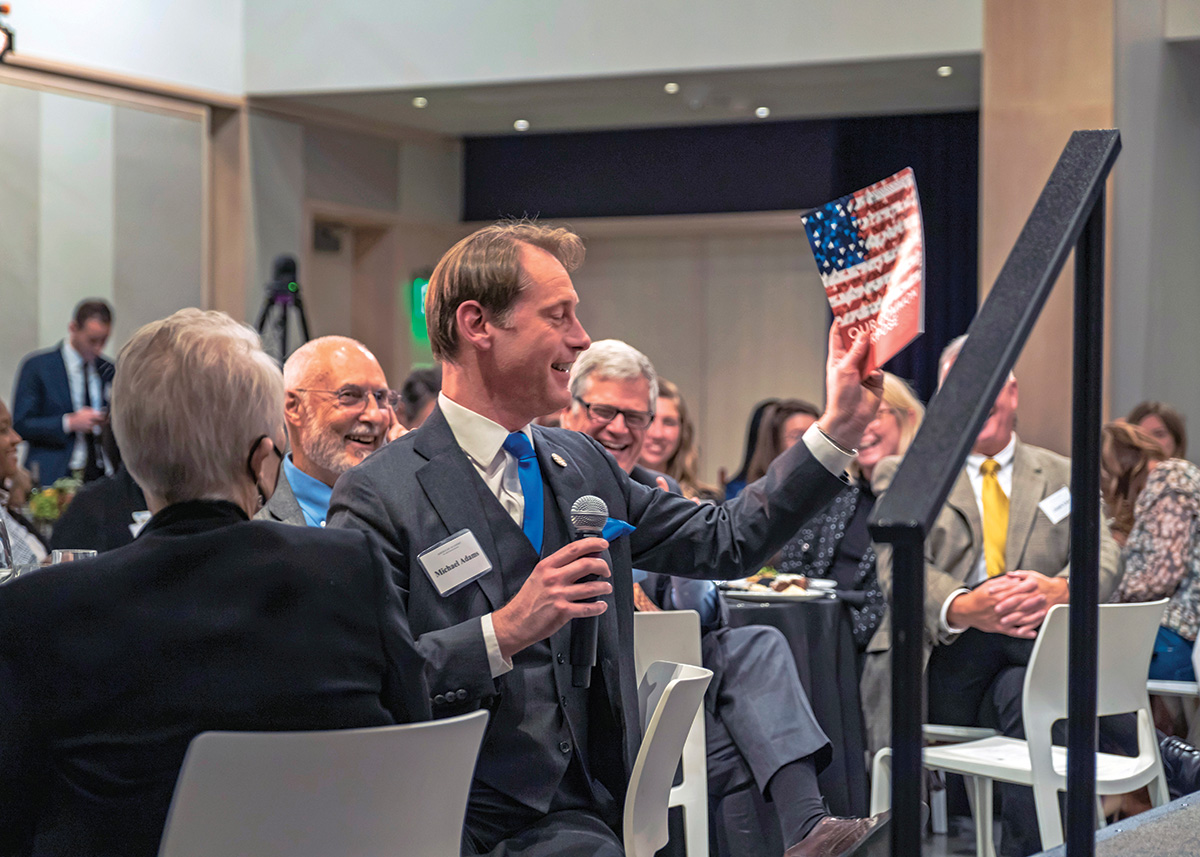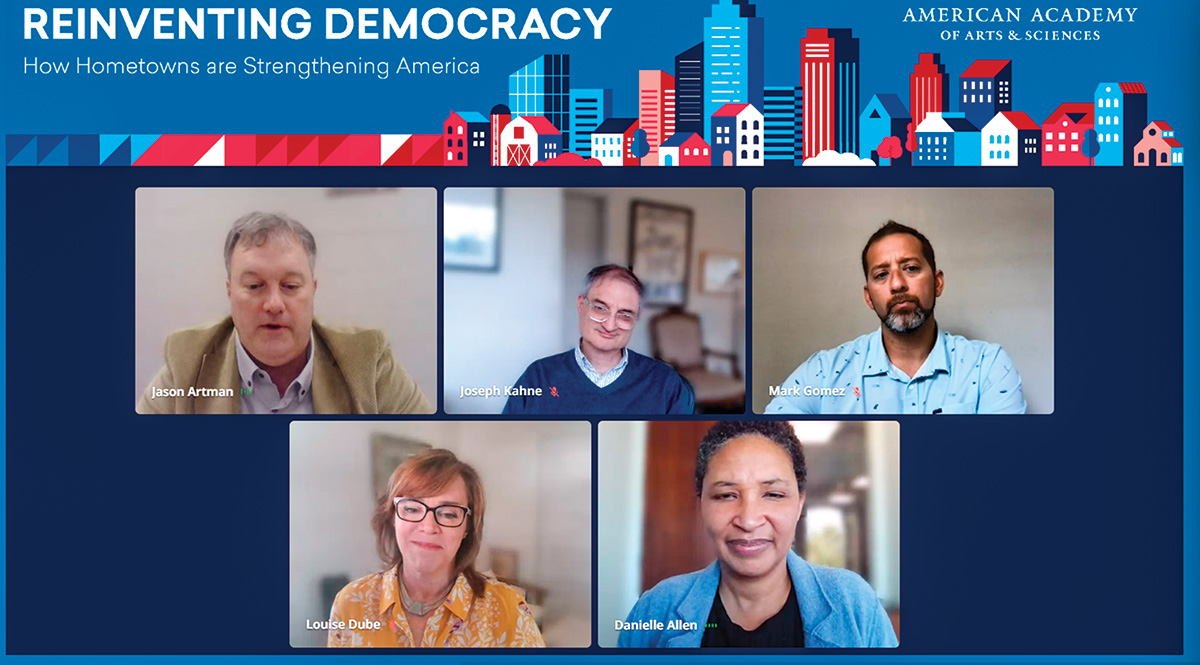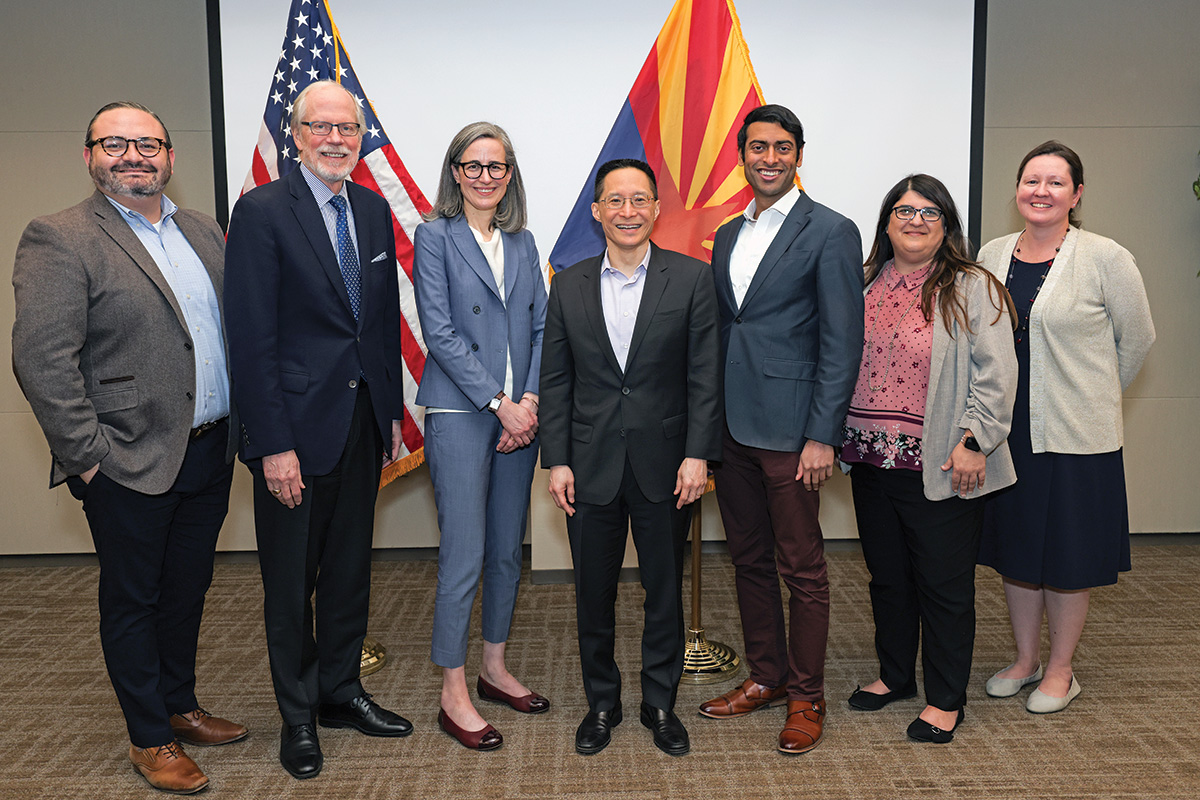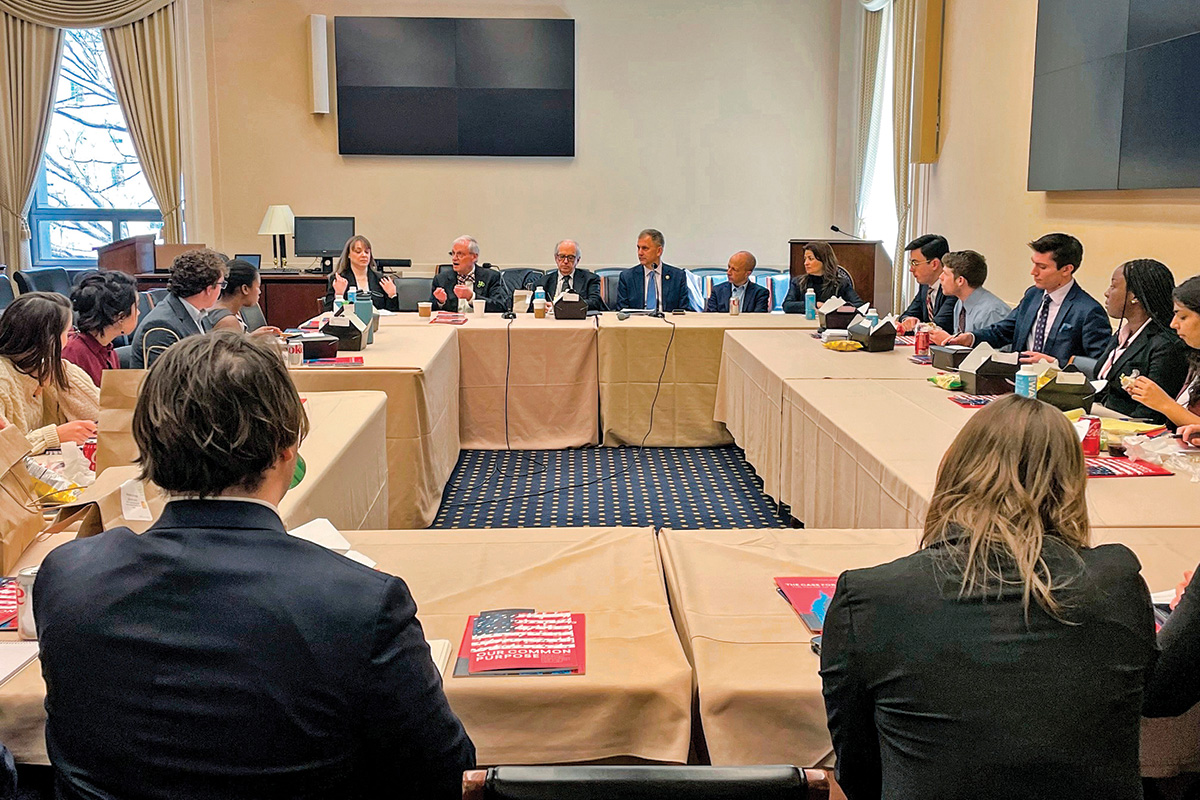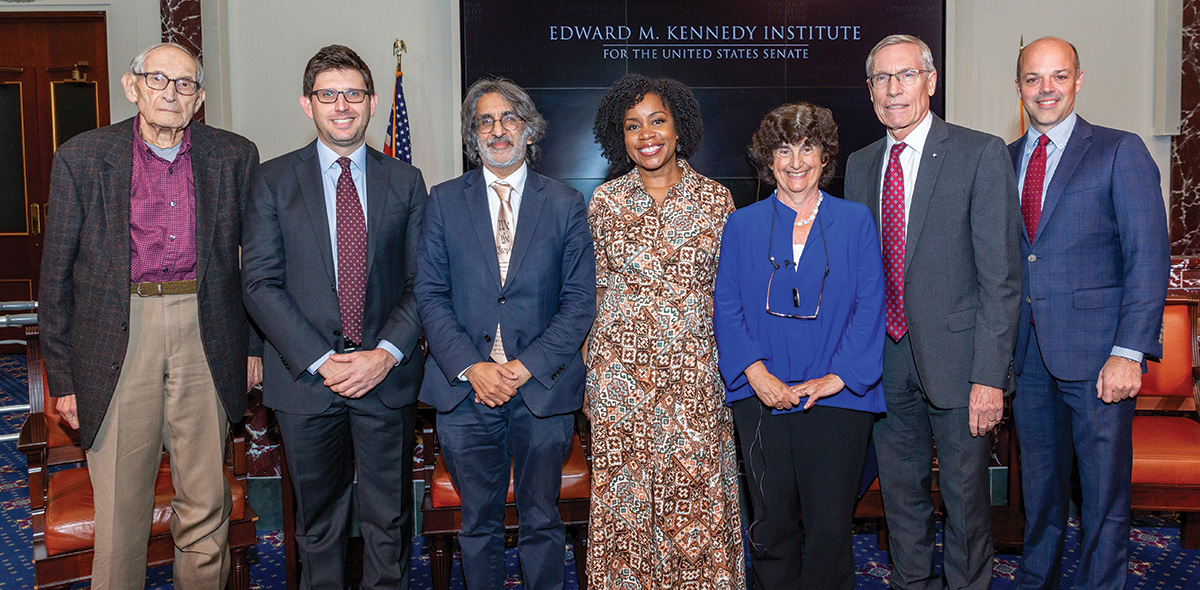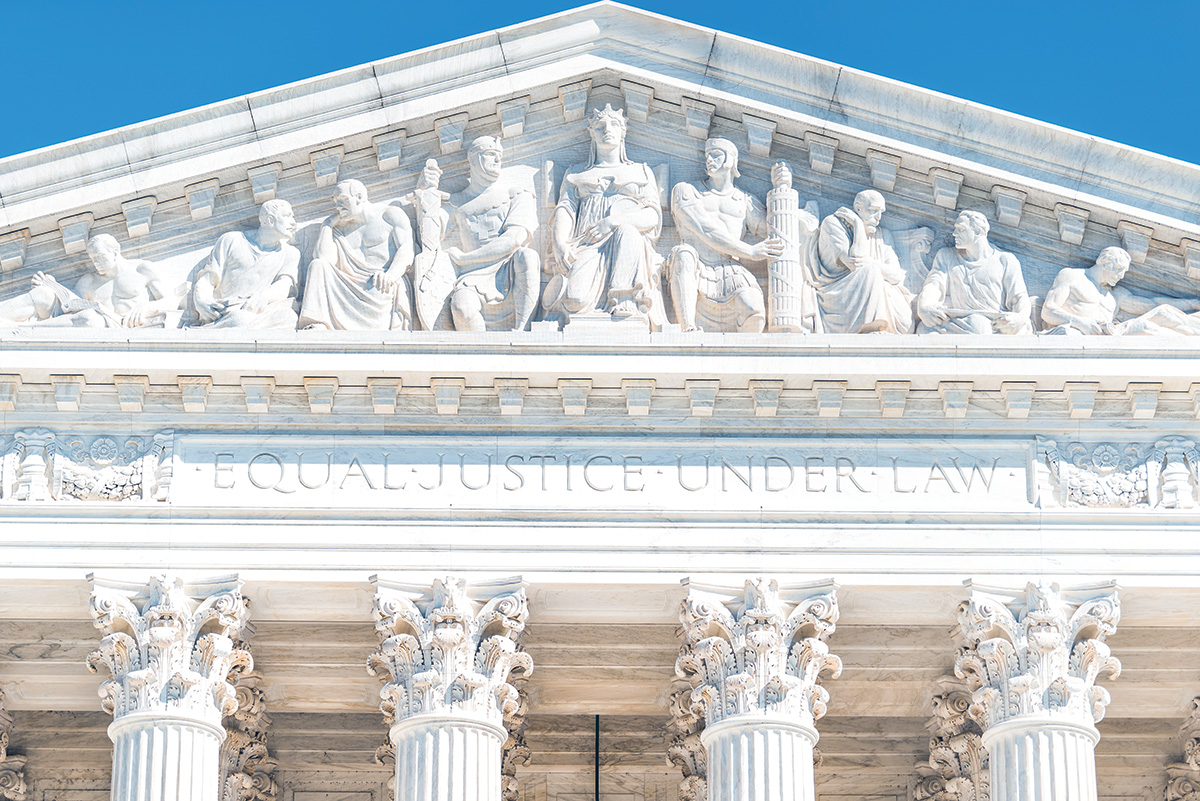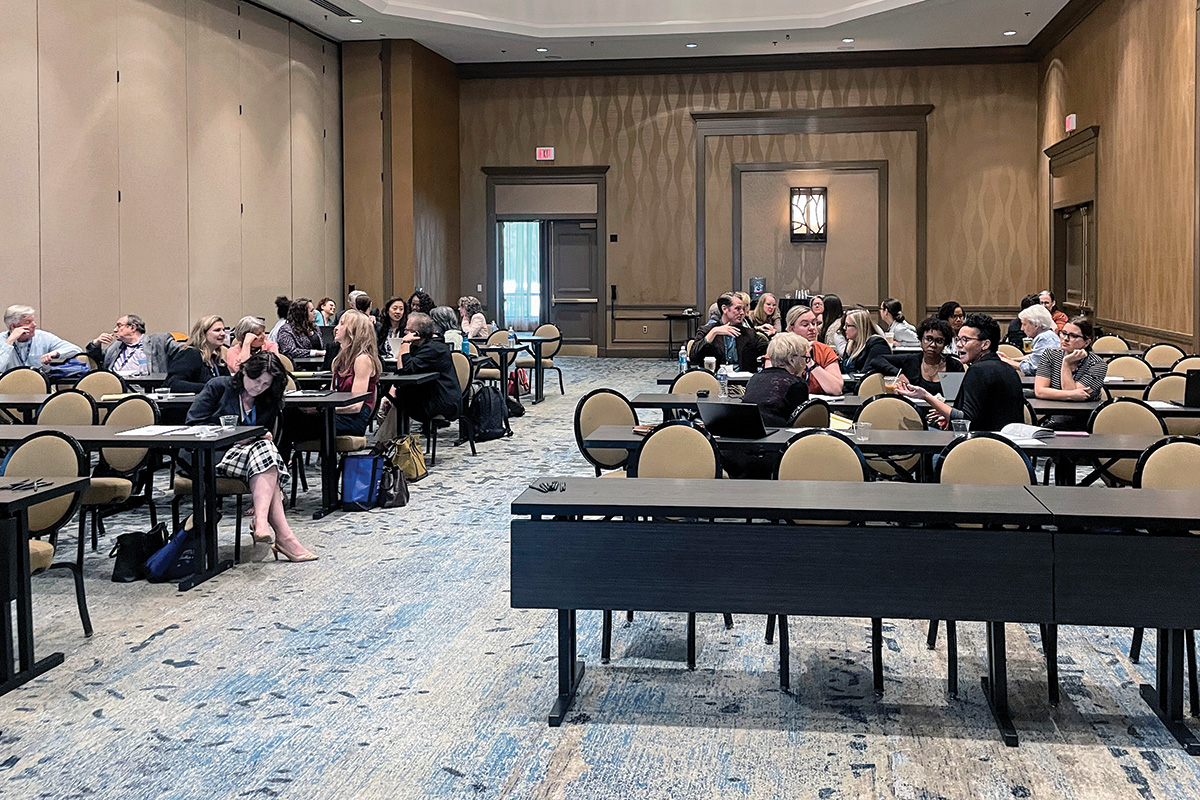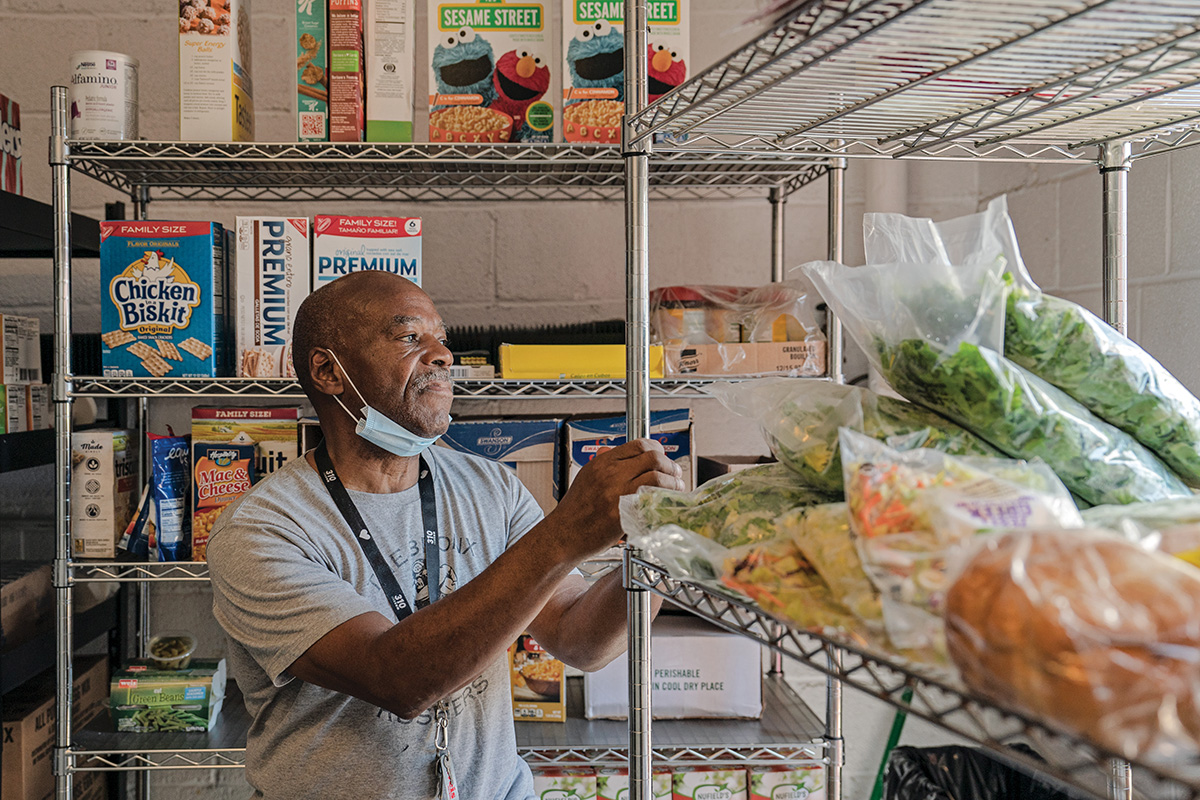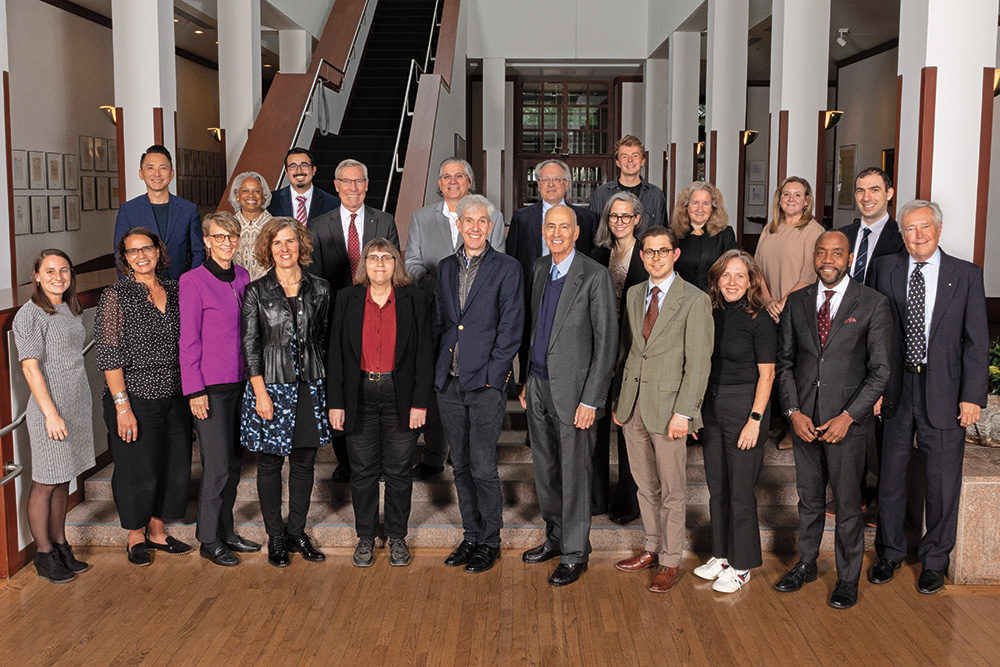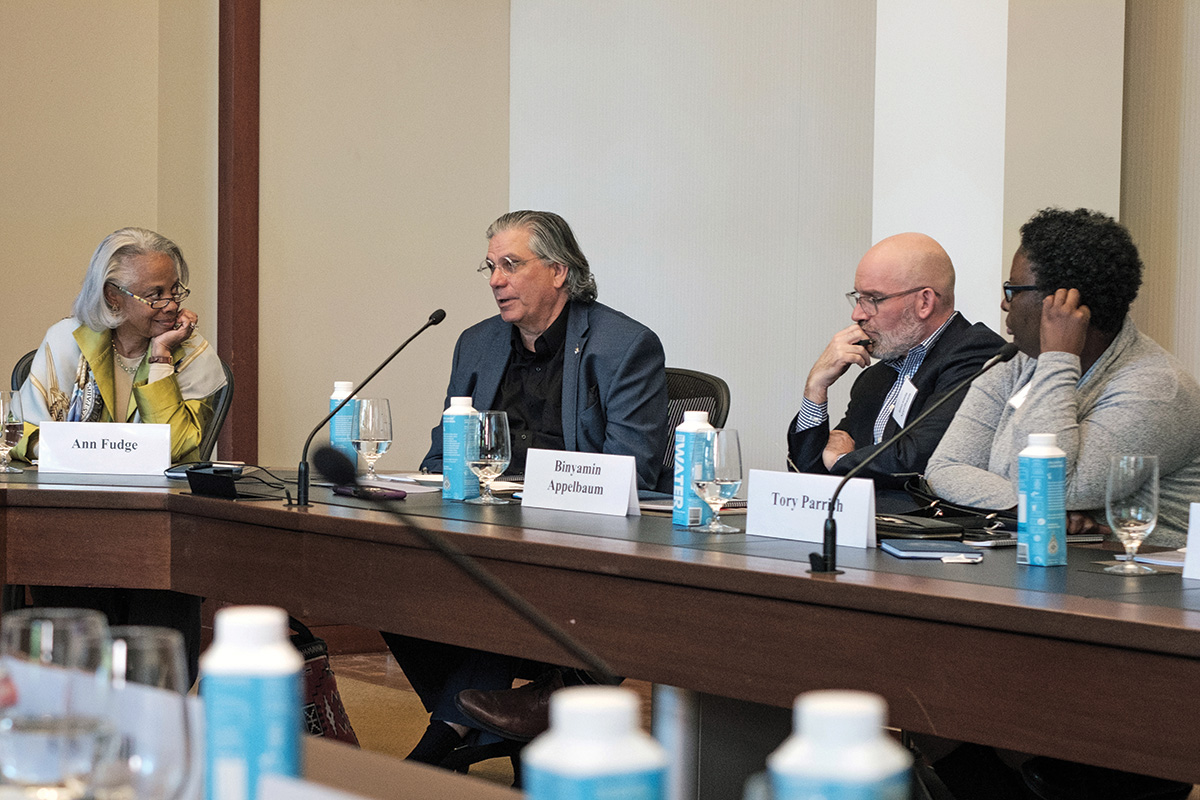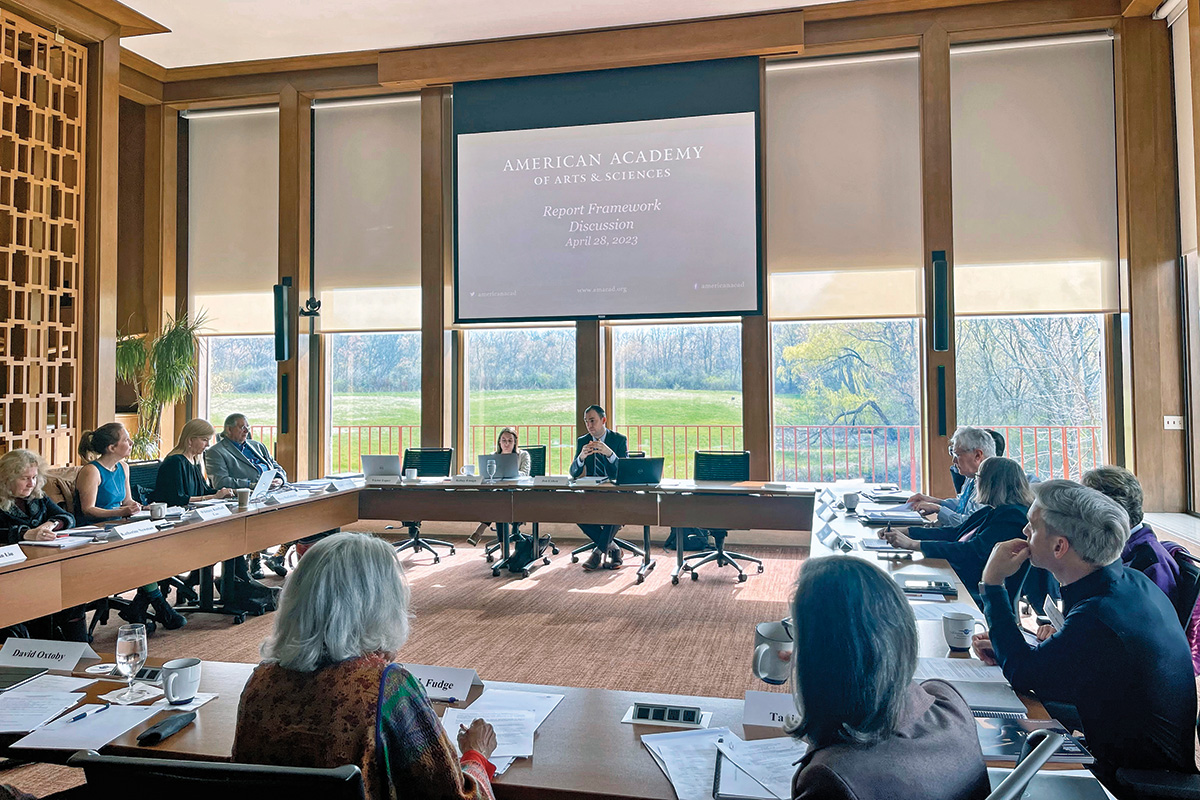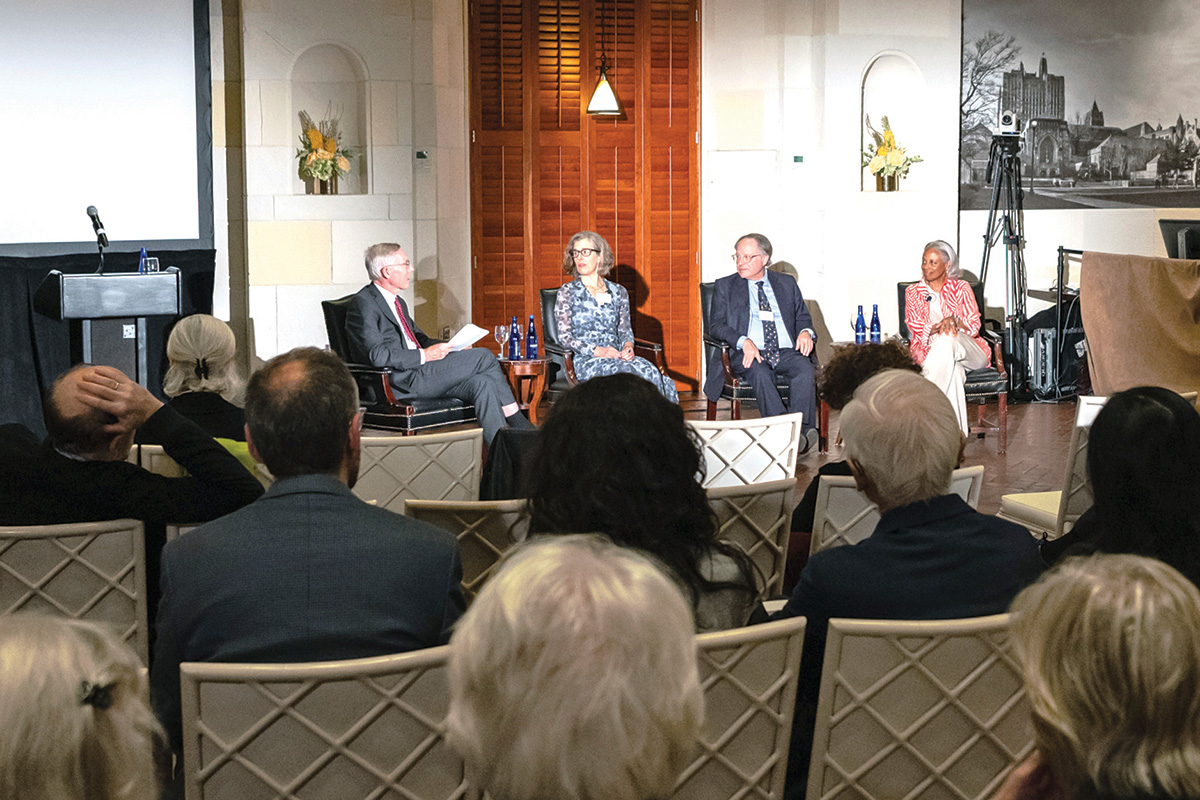The American Academy of Arts and Sciences was founded by visionaries who foresaw that the nascent republic would benefit from the expertise of learned citizens to guide its development, health, and integrity through whatever challenges may arise.
Today, the clarity of that vision has never been more evident. The pandemic, the 2020 election and its aftermath, and the movement for justice and reform in the wake of repeated racial injustice have demonstrated the importance of shoring up our institutions and civil society on behalf of the public good. We find ourselves in a time of deepening divides across lines of politics, race, religion, income, and opportunity. The institutions we have long turned to for leadership and information are under fire, as trust in the media, government, commercial enterprise, and academia declines. Strong and responsive institutions and a healthy civil society can carry us through crises and are vitally important in their aftermath.
From these challenges springs an ever-greater need for innovation and reinvestment in America’s founding values and its promise. As the Academy’s report Our Common Purpose: Reinventing American Democracy for the 21st Century notes, we are experiencing an age of surging civic participation, “of communities working to build new connections across long-standing divides, and of citizens suddenly awakening to the potential of their democratic responsibilities.” It is in times like these that members of the Academy, through projects in the American Institutions, Society, and the Public Good program, combine their extraordinary and diverse expertise to strengthen the relationships between our national institutions, civil society, and the citizens they serve and represent.
Project
Commission on the Practice of Democratic Citizenship
The Commission on the Practice of Democratic Citizenship is a multiyear project of the Academy. The Commission launched in 2018 to explore the factors that encourage and discourage people from becoming engaged in their communities. The Commission’s report, Our Common Purpose: Reinventing American Democracy for the 21st Century, seeks to improve democratic engagement in the United States with a set of thirty-one recommendations that reach across political institutions, civic culture, and civil society to revitalize American democracy by increasing representation, empowering voters, making institutions more responsive, and reinvigorating our civic culture.
The Academy has committed to make significant progress on all thirty-one recommendations by 2026, the nation’s 250th anniversary. In collaboration with champion organizations and leaders from across the nation who are committed to the advancement of the recommendations, the Academy will host public events and targeted briefings, provide expert testimony and thought leadership, convene experts and practitioners for knowledge sharing and strategy development, create op-eds and other earned media, and in other ways stand up and support the ongoing implementation of Our Common Purpose.
Commission Chairs
Danielle Allen
Harvard University
Stephen B. Heintz
Rockefeller Brothers Fund
Eric P. Liu
Citizen University
Commission Members
Sayu Bhojwani
Women’s Democracy Lab
danah boyd
Data & Society
Caroline Brettell
Southern Methodist University
David Brooks
The New York Times
David Campbell
University of Notre Dame
Alan Dachs
Fremont Group
Dee Davis
Center for Rural Strategies
Jonathan Fanton
American Academy of Arts and Sciences
Lisa Garcia Bedolla
University of California, Berkeley
Sam Gill
Doris Duke Charitable Foundation
R. Marie Griffith
John C. Danforth Center on Religion & Politics, University of Washington in St. Louis
Hahrie Han
Stavros Niarchos Foundation, Agora Institute, Johns Hopkins University
Antonia Hernández
California Community Foundation
Wallace Jefferson
Alexander Dubose & Jefferson, LLP
Joseph Kahne
University of California, Riverside
Kei Kawashima-Ginsberg
Tufts University
Yuval Levin
American Enterprise Institute
Carolyn Lukensmeyer
formerly, National Institute for Civil Discourse
Martha McCoy
Everyday Democracy
Lynn Nottage
Playwright
Steven Olikara
Millennial Action Project
Norman Ornstein
American Enterprise Institute
Robert Peck
FPR Partners
Pete Peterson
School of Public Policy, Pepperdine University
Miles Rapoport
Ash Center for Democratic Governance and Innovation, Harvard University
Michael Schudson
Columbia University
Sterling Speirn
formerly, National Conference on Citizenship
Marcelo Suárez-Orozco
University of Massachusetts Boston
Ben Vinson
Howard University
Diane P. Wood
U.S. Court of Appeals, Seventh Circuit
Judy Woodruff
PBS
Ethan Zuckerman
University of Massachusetts Amherst
Project Staff
Kelsey Ensign
Louis W. Cabot Humanities Policy Fellow
Zachey Kliger
Program Associate for American Institutions, Society, and the Public Good
Jessica Lieberman
Program Officer for American Institutions, Society, and the Public Good
Abhishek Raman
Program Officer for American Institutions, Society, and the Public Good
Peter Robinson
Interim Chief Program Officer and Morton L. Mandel Director of Strategic Implementation
Betsy Super
Program Director for American Institutions, Society, and the Public Good
Funders
S. D. Bechtel, Jr. Foundation
Rockefeller Brothers Fund
The John S. and James L. Knight Foundation
The William and Flora Hewlett Foundation
Ford Foundation
The Conrad N. Hilton Foundation
The Suzanne Nora Johnson and David G. Johnson Foundation
The Clary Family Charitable Fund
Alan and Lauren Dachs
Sara Lee Schupf and the Lubin Family Foundation
Joan and Irwin Jacobs
Patti Saris
David M. Rubenstein
Commission Publications
The Case for Supreme Court Term Limits, U.S. Supreme Court Working Group (American Academy of Arts and Sciences, 2023)
The Case for Enlarging the House of Representatives, Lee Drutman, Jonathan D. Cohen, Yuval Levin, and Norman J. Ornstein (American Academy of Arts and Sciences, 2021)
Our Common Purpose: Reinventing American Democracy for the 21st Century (American Academy of Arts and Sciences, 2020)
The Political and Civic Engagement of Immigrants, Caroline Brettell (American Academy of Arts and Sciences, 2020)
The Data Driving Democracy, Christina Couch (American Academy of Arts and Sciences, 2020)
The Internet and Engaged Citizenship, David Karpf (American Academy of Arts and Sciences, 2019)
Commission Meetings
Supreme Court Term Limits Working Group
June 2022–February 2023
One of the recommendations in the Our Common Purpose report is to implement eighteen-year term limits for Supreme Court justices. While this idea has received bipartisan support, there remain many important and open questions about how the reform would operate. In June 2022, the Academy convened a working group, including Commission members Diane P. Wood and Norman Ornstein and leading legal scholars, to answer these questions and assess the constitutionality of implementing eighteen-year term limits for Supreme Court justices by statute. The working group met monthly from June 2022 through February 2023 to develop a paper that presents a complete, feasible statutory model and an argument for the constitutionality of that model. The working group’s final paper, The Case for Supreme Court Term Limits, was released in October 2023.
U.S. Supreme Court Working Group Members
Akhil Reed Amar
Yale Law School
Guy-Uriel Charles
Harvard Law School
Seth Davis
UC Berkeley School of Law
Daniel Epps
Washington University School of Law
Caroline Fredrickson
Georgetown Law School & Brennan Center for Justice
Charles Fried
Harvard Law School
Amanda Hollis-Brusky
Pomona College
Norman Ornstein
American Enterprise Institute
Kermit Roosevelt III
University of Pennsylvania Carey Law School
Maya Sen
Harvard Kennedy School
Diane P. Wood
U.S. Court of Appeals, Seventh Circuit
America250 Cross-City and Context Sharing Meeting
September 27, 2022; December 15, 2022; May 8, 2023
In 2022, the Academy began convening multiple discussions with representatives from organizations that are planning to commemorate the 250th anniversary of the Declaration of Independence. These representatives came from museums, libraries, local history agencies, state humanities councils, and other organizations. This group has sought to identify both the opportunities and challenges that commemorating the 250th anniversary presents, especially at a time of increased division and polarization. Group members collaborated on how to use this anniversary to get Americans to reflect openly and honestly about our nation’s history. All members agreed that the 250th anniversary commemoration represents an opportunity for Americans to engage with one another as fellow citizens and share their aspirations for the future of our democracy.
Academy Member Roundtables on Democracy
September–October 2022
As part of the ongoing work to advance democracy reform and the ideas and recommendations presented in the Our Common Purpose report, the Academy convened eleven virtual member roundtable discussions on democracy. The 137 members who participated in these discussions are influential leaders in biomedical research and public health, science and engineering, media and journalism, business, and law. The participants explored how democracy benefits their sectors, and what they can do within their own institutions to strengthen democracy.
Roundtable Discussion Moderators
Danielle Allen
Harvard University
Daniella Ballou-Aares
Leadership Now Project
Sam Gill
Doris Duke Charitable Foundation
Stephen B. Heintz
Rockefeller Brothers Fund
Eric P. Liu
Citizen University
Martha McCoy
Philanthropic Initiative for Racial Equity
David W. Oxtoby
American Academy of Arts and Sciences
Diane P. Wood
U.S. Court of Appeals, Seventh Circuit
Judy Woodruff
PBS NewsHour
OCP in Lexington, Kentucky
October 18, 2022
Lexington, Kentucky, was the site of six listening sessions conducted by the Commission in 2019 to shape the Our Common Purpose report. In fall 2022, Cochair Stephen B. Heintz and Commission member Caroline Lukensmeyer returned to Lexington for a full day of events to highlight the contributions made by Kentucky residents to the work of the Commission and to engage with local leaders on strategies for implementing Our Common Purpose recommendations. The events included an interview with Renee Shaw for the KET program Connections, meetings with Kentuckians who participated in the Commission’s listening sessions in 2019 and with local leaders from the Blue Grass Community Foundation and CivicLex, meetings at the Council of State Governments, and a reception with Kentucky leaders, including Michael Adams, Kentucky’s Secretary of State, and Linda Gorton, Mayor of Lexington, to discuss the Our Common Purpose report. The reception featured a panel discussion moderated by Renee Shaw and a Q&A session with audience members.
Building Democratic Citizens Higher Education Working Group
October 2022–June 2023
Following a series of virtual roundtable discussions on building democratic citizens in higher education, the Academy convened a working group to develop a comprehensive guide on specific models, mechanisms, and measurements for preparing democratic citizens in higher education. The working group met monthly from October 2022 through June 2023 and is developing a guide that will be published in early 2024 and be disseminated broadly to leaders in the higher education community.
Working Group Members
Josh Blakely
Longwood University
Trevor Brown
The Ohio State University
David Campbell
University of Notre Dame
Jane Kamensky
Harvard University
Devorah Lieberman
University of La Verne
Fayneese Miller
Hamline University
Laurie Patton
Middlebury College
Sandra Peart
University of Richmond
Ravi Perry
Howard University
Carol Quillen
Davidson College
Eric Reveno
Oregon State University
Anthony Scott
Virginia Tech
Sarah Surak
Salisbury University
Andrew Taramykin
University of Florida
Nancy Thomas
Tufts University
Deanna Villanueva-Saucedo
Maricopa Community Colleges
Ben Vinson
Howard University
Marianne Wanamaker
The University of Tennessee
Scott Warren
Johns Hopkins University
National Service Focus Groups
November–December 2022
One of the recommendations in the Our Common Purpose report would establish a universal expectation of a year of national service and dramatically expand funding for service programs or fellowships that would offer young people paid service opportunities. Increased funding for service opportunities will make them more accessible but will not necessarily foster a culture in which national service is the norm. For this reason, it is important to better understand the factors that motivate Americans to participate in service, as well as the barriers that prevent them from seeking out or completing service opportunities. To begin to develop this understanding, the Academy partnered with California Volunteers to convene five virtual focus groups with over sixty current and former service program participants in the state of California. Feedback from these participants informed a subsequent set of focus groups and public opinion surveys conducted with our research partner, David Binder Research. Results from this research, released in late fall 2023, will help produce new strategies to build greater demand for service opportunities.
Reinventing Democracy: How Hometowns Are Strengthening America
December 7–9, 2022
The Academy hosted a three-day virtual symposium that featured panels of experts and local leaders sharing practical advice on topics such as ranked-choice voting, clean elections, civic education, civic infrastructure, and mechanisms to increase citizen participation. The event attracted participants from forty-three states, including mayors, city councilors, and other local government officials. The symposium also served as the launch of the Our Common Purpose (OCP) Communities Project. OCP Communities choose and adopt from a menu of applicable OCP recommendations to create a network of local laboratories of democracy. At the event, Lexington, Kentucky, signed on as the first OCP Community.
Speakers
Danielle Allen
Harvard University
Jason Artman
Medota, Illinois Public Schools
Sayu Bhojwani
Women’s Democracy Lab
Kristerfer Burnett
Baltimore City Council, District 8
Jerren Chang
GenUnity
Louis Dubé
iCivics
Peggy Flynn
City of Petaluma, California
Archon Fung
Harvard University
Mark Gomez
California State University Monterey Bay
Shamichael Hallman
Cossitt Library (Memphis Public Libraries)
Linda Harris
City of Decatur, Georgia
Chris Hughes
Ranked Choice Voting Resource Center
Joseph Kahne
Civic Engagement Research Group
Malka Ranjana Kopell
Civity
Kevin Kosar
American Enterprise Institute
Tom Latkowski
Los Angeles for Democracy Vouchers
Eric P. Liu
Citizen University
Martha McCoy
Philanthropic Initiative for Racial Equity
Anu Natarajan
Meta
Carmen Ortiz
City of Durham, North Carolina
David W. Oxtoby
American Academy of Arts and Sciences
Kathleen Patterson
Washington, D.C., Auditor
Maria Perez
Democracy Rising
Pete Peterson
Pepperdine University
Rosemonde Pierre-Louis
NY McSilver Institute for Poverty Policy and Research
Kelleen Leishman Potter
Utah Ranked Choice Voting
Alex Renirie
Healthy Democracy
Max Resnik
City Bureau
Cynthia Richie Terrell
RepresentWomen
Lynn Ross
Spirit for Change Consulting
Hollie Russon Gilman
New America
Dave Smith
X Sector Labs
Palma Joy
StrandCivity
John Sweat
Concord, North Carolina City Council
Judy Woodruff
PBS NewsHour
Richard Young
CivicLex
OCP in Phoenix, Arizona
February 3, 2023
Phoenix was the site of several listening sessions conducted by the Commission in 2019 to shape the Our Common Purpose report. Cochairs Stephen B. Heintz and Eric P. Liu and Commission member Steven Olikara returned to Phoenix for a series of events to connect with listening session participants, local civic leaders, and Academy members, and to socialize Our Common Purpose recommendations to advance local implementation. The events were cohosted by the Arizona Civic Life Partnership, which includes the Center for the Future of Arizona, Vitalyst Health Foundation, and the Flinn Foundation.
Commission Meeting
February 10, 2023
Members of the Commission on the Practice of Democratic Citizenship convened virtually to reflect on the events that have occurred since the release of the Our Common Purpose report, to consider how the recommendations and strategies have fared, and to discuss priorities for the Academy’s outreach and implementation in the coming year.
Democracy Reform in the New Congress
March 8, 2023
This luncheon for congressional staff featured members of Congress as well as a bipartisan panel of experts who discussed potential areas for cooperation on democracy reform. The panelists focused on several ideas recommended in the Our Common Purpose report, including expanding the U.S. House of Representatives, ranked-choice voting, and campaign finance reform. Bipartisan staff from the House Committee on Administration and from fifteen congressional offices attended the event.
Speakers
Sayu Bhojwani
Women’s Democracy Lab
Earl Blumenauer
U.S. House of Representatives, Oregon’s Third Congressional District
Sean Casten
U.S. House of Representatives, Illinois’s Sixth Congressional District
Yuval Levin
American Enterprise Institute
Norman Ornstein
American Enterprise Institute
Civic Culture Working Group
Beginning April 2023
The Academy, in partnership with the Aspen Institute’s Citizenship and American Identity Program and Citizen University, convened a working group to inform the national conversation about the centrality of a healthy civic culture to American constitutional democracy, build trust across lines of difference, and inspire a resilient civic faith for the twenty-first century. This work will develop a typology that will clarify the process of investing in, encouraging, and building a healthy civic culture. The working group will develop a user-friendly publication articulating a consensus on “what, why, and how” of civic culture as a practice, including the norms, narratives, values, rituals, habits, mindsets, and heartsets that are reflected in a healthy civic culture. This publication will be used to guide practitioners in building a healthy civic culture and attract new funding to civic culture initiatives. The working group met monthly from April through October 2023 and is developing a final publication that will be published in early 2024 and be disseminated broadly to civic culture practitioners and funders investing in civic culture initiatives.
Working Group Members
Kristen Cambell
Philanthropy for Active Civic Engagement (PACE)
Sybil Francis
Center for the Future of Arizona
David French
The Dispatch
Sam Gill
Doris Duke Charitable Foundation
Ted Johnson
New America
Ben Klutsey
Mercatus Center
Mathieu Lefevre
More in Common
Peter Levine
Tufts University
Patty Loew
Northwestern University
Eunice Lin Nichols
CoGenerate
Suzanne Nossel
PEN America
Eboo Patel
Interfaith America
John Spann
Mississippi Humanities Council
Shanta Thake
Lincoln Center for the Performing Arts
Natalie Tran
CAA Foundation
Jose Antonio Vargas
Define American
A Radical Old Idea: Expanding the U.S. House of Representatives
May 16, 2023
The first recommendation in the Our Common Purpose report is to expand the U.S. House of Representatives. A working group convened by the Academy issued a follow-up report, The Case for Enlarging the House of Representatives, that outlined the principles that should undergird a House expansion formula, surveyed extant proposals for House expansion, and discussed the possible outcomes of expansion. In this virtual event, authors of the report, other scholars, and members of Congress discussed why increasing the number of Representatives in the House is crucial to the health of our democracy and what it will take to restore the Founders’ vision for the First Branch.
Speakers
Danielle Allen
Harvard University
Earl Blumenauer
U.S. House of Representatives, Oregon’s Third Congressional District
Derek Kilmer
U.S. House of Representatives, Washington’s Sixth Congressional District
Yuval Levin
American Enterprise Institute
Norman Ornstein
American Enterprise Institute
Pete Peterson
Pepperdine University
The Promise of Proportional Representation for Democracy
July 27, 2023
Moving to a system of multi-member districts with proportional representation could end gerrymandering, reduce polarization, and help more Americans feel their voice is represented in Congress. However, a little-known 1967 law, the Uniform Congressional District Act, prevents this reform and locks the United States into a deeply flawed electoral system. The Our Common Purpose report recommends amending this law and moving toward a proportional system. In this virtual event, Our Common Purpose champions and others discussed why a growing body of experts believe this reform would strengthen American democracy.
Speakers
Andy Craig
Rainey Center
Steven Olikara
Millennial Action Project
Norman Jay Ornstein
American Enterprise Institute
Alora Thomas-Lundborg
Charles Hamilton Houston Center for Race & Justice, Harvard Law School
Grant Tudor
Protect Democracy
Safeguarding American Democracy: Civic Literacy for a Secure Nation
October 5, 2023
A significant number of today’s K-12 students will enter college and the workforce without the civic knowledge, skills, and dispositions that they need to fully participate in our constitutional democracy. Lack of civic readiness among young Americans undermines civil discourse, increases alienation and polarization, and makes us more susceptible to misinformation and disinformation. As a result, a growing body of civil society leaders and policymakers have been making the case that the lack of civic readiness among Americans poses a threat to our national security. At this virtual event, sponsored by the Academy and iCivics, Academy members and Our Common Purpose champions discussed the stakes involved in fostering our civic strength and explored promising solutions to promote lifelong civic learning.
Speakers
Danielle Allen
Harvard University
Louise Dubé
iCivics
James N. Mattis
Stanford University
The Legislative Path to Supreme Court Reform
Boston, Massachusetts, and Virtual
October 25, 2023
This event, hosted by the Academy and the Edward M. Kennedy Institute for the United States Senate, celebrated the release of The Case for Supreme Court Term Limits, the final publication of the Academy’s U.S. Supreme Court Working Group. The event featured a panel of working group members and other experts who discussed the new publication, the benefits and challenges associated with establishing Supreme Court term limits, and the role the Senate might play in enacting such a reform.
Speakers
Akhil Reed Amar
Yale Law School
Charles Fried
Harvard Law School
Patti Saris
U.S. District Court, District of Massachusetts
Project
Making Justice Accessible
Civil justice initiatives reach Americans far beyond the courthouse doors. In today’s America, we have legal information and services that can be delivered by lawyers, licensed practitioners, and trained advocates. A myriad of professionals can provide invaluable guidance and counseling, design new products and tools for judges, lawyers, and litigants, and generate free information to help people navigate legal systems on their own. But most Americans cannot access this help. In most cases, lawyers and those authorized to deliver help have to turn people away because financial and human resources are strained—there is not enough supply to meet demand.
The Making Justice Accessible project is working to address this challenge. At the core of the work is developing a national strategic vision that will inspire consequential collaboration to unlock funding and human potential to address the civil justice crisis. Since launching a two-year implementation effort in February 2022, the project has interviewed providers, scholars, field experts, and thought leaders, convened stakeholder roundtables, and briefed congressional policymakers about the potential that civil justice initiatives have to alleviate precarity and empower American communities. The project team’s continuous engagement with elected leaders; with corporate, public, and private philanthropy; and with corporate social responsibility professionals is aimed at raising awareness about the critical role civil justice has in our society.
This effort builds on the project’s publications focused on the challenges of providing legal services to low-income Americans. The first project, Designing Legal Services for the 21st Century, produced the Civil Justice for All report, which recommends targeted civil justice investments in financial and human resources, simplified procedures to reduce barriers and administrative strain, greater coordination and new partnerships across disciplines, and a larger field of advocates and legal professionals trained to provide effective and accessible legal help. The second project, Data Collection and Legal Services for Low-Income Americans, produced the Measuring Civil Justice for All report, which established a blueprint for civil justice data collection efforts and a research agenda for civil justice scholars, practitioners, and policymakers. The related Winter 2019 issue of Dædalus on “Access to Justice” is a multidisciplinary study of the civil justice gap, examining new models for the delivery of legal help. The Academy’s work is informed by the advice and insights of civil justice experts and representatives of courts, legal aid, pro bono programs, and private and public foundations; justice professionals; researchers; educators; and policy professionals who make up the civil justice ecosystem.
Every aspect of modern American life exposes us to legal systems. Yet, the information, resources, services, and professionals needed to help Americans navigate those systems are not within reach for most. Although these interactions are common and most handle them on their own, the cost of getting it wrong is steep and becoming steeper: borrowing money for housing, school, and necessities; starting a family and raising children; getting educated or upskilling; accessing public and civic services; and choosing opportunities. Legal systems are at the core of American life. It is essential, therefore, to understand, support, and partner with initiatives in the field getting Americans the help they need. The Making Justice Accessible project advances a national strategy that will promote and strengthen momentum toward civil justice for all.
Advisory Committee Chairs
John Levi
Legal Services Corporation; Sidley Austin LLP
Martha Minow
Harvard Law School
Advisory Committee Members
Kimberly Budd
Massachusetts Supreme Judicial Court
Colleen Cotter
Legal Aid Society of Cleveland
Ronald Flagg
Legal Services Corporation
Ivan Fong
Medtronic
Kenneth C. Frazier
formerly, Merck & Co.
Bethany Hamilton
National Center for Medical-Legal Partnership
Nathan Hecht
Texas Supreme Court
Wallace B. Jefferson
Alexander Dubose & Jefferson, LLP
Joseph Kennedy III
U.S. Department of State; Groundwork Project
Lance Liebman
Columbia Law School
Jonathan Lippman
Latham & Watkins, LLP
Lora J. Livingston
Texas 261st Civil District Court
Judy Perry Martinez
Simon, Peragine, Smith & Redfearn
Bridget Mary McCormack
American Arbitration Association
Margaret Morrow
formerly, U.S. District Court, Central District of California
David W. Oxtoby
American Academy of Arts and Sciences
Rohan Pavuluri
Upsolve
Andrew M. Perlman
Suffolk University School of Law
Daniel B. Rodriguez
Northwestern Pritzker School of Law
Rebecca Sandefur
T. Denny Sanford School of Social and Family Dynamics, Arizona State University
William Treanor
Georgetown University Law Center
Jo-Ann Wallace
National Legal Aid & Defenders Association Insurance Program
Diane P. Wood
U.S. Court of Appeals, Seventh Circuit
Project Staff
Eduardo Gonzalez
Program Officer for American Institutions, Society, and the Public Good
Peter Robinson
Interim Chief Program Officer and Morton L. Mandel Director of Strategic Implementation
Betsy Super
Program Director for American Institutions, Society, and the Public Good
Funder
David M. Rubenstein
Project Publications
Measuring Civil Justice for All (American Academy of Arts and Sciences, February 2021)
Civil Justice for All (American Academy of Arts and Sciences, September 2020)
“Access to Justice,” Dædalus, edited by Lincoln Caplan, Lance Liebman, and Rebecca Sandefur (Winter 2019)
Project Meetings
Advisory Committee Meetings
August 31, 2022; December 5, 2022; April 24, 2023
Access to Justice & ESG–Social Impact Conference
Pro Bono Institute, Washington, D.C.
February 22, 2023
At the Pro Bono Institute’s Annual Social Impact Conference, Program Officer Eduardo Gonzalez spoke about the role Access to Justice has in corporate and law firm environmental, social, and governmental (ESG) initiatives and sustainability commitments.
Legal Services Funders: Doing More Together–National Association of IOLTA Programs
Dallas, Texas
May 3, 2023
At the inaugural gathering of the National Association of IOLTA Programs, Program Officer Eduardo Gonzalez joined Erika Rickard (Pew Charitable Trusts) to elevate the importance of investing in collaborative relationships across institutions responsible for evaluating and funding civil justice initiatives.
Making Civil Justice a Funding Imperative–Equal Justice Conference
Dallas, Texas
May 5, 2023
At the nation’s largest civil justice conference, Program Officer Eduardo Gonzalez presented an update on the project and highlighted three major insights: strategic coordination requires continuous engagement; the civil justice field has exemplar models and solutions, but they are disproportionately allocated; and as innovations emerge and conditions change, new opportunities are possible.
AI’s Implications for Equitable Access to Legal & Other Professional Services
May 10, 2023
This virtual meeting explored how increasingly capable AI tools like ChatGPT and Bing Chat will impact the accessibility of legal and other professional services, such as health care, for an underserved public.
Speakers
Jason Barnwell
Microsoft
Margaret Hagen
Stanford Law School
Martha Minow
Harvard Law School
Andrew M. Perlman
Suffolk University School of Law
State Innovation Congressional Briefings
October 18–19, 2023
Program Officer Eduardo Gonzalez and Steven Goldblatt (The Suffolk Group) conducted virtual briefings with the entire Arizona congressional delegation to share the project’s civil justice recommendations. They also held nine in-person briefings with congressional offices in Arizona, Pennsylvania, and Minnesota.
American Workforce & Justice Summit 2023
October 25–26, 2023
Program Officer Eduardo Gonzalez attended the Responsible Business Initiative for Justice’s Workforce & Justice Summit, a gathering of U.S. businesses, policy experts, and campaign advocates. The event focused on justice and opportunity and emphasized the critical role U.S. businesses have to stabilize lives after incarceration and unlock opportunity for justice-impacted communities.
Strategic Coordination in Justice Systems: Overcoming Silos and Building Collaborative Partnerships
October 31–November 2, 2023
Columbus, Ohio
This event was hosted by the American Bar Association and convened, for the first time, members of three committees vital to coordinating legal help in every state: State Access to Justice Commission Chairs, State IOLTA Programs, and the Legal Information Referral & Information Services Standing Committee. At the meeting, Program Officer Eduardo Gonzalez moderated a discussion with Judge Mark Juhas (Superior Court of Los Angeles) about coordinating across silos in justice systems. Participants discussed the impact silos have on state-specific connections with legislators, judicial leaders, and legal help providers, and the integrated landscape of justice causes that can entrench these silos.
Project
Commission on Reimagining Our Economy
Economic uncertainty is a disruptive force in American life. In the United States today, too many families are unable to achieve the life they want despite their best efforts, too many communities have not benefited from economic growth, and too many Americans believe the economy does not work for people like them. These conditions not only harm lives and livelihoods, but they also sow distrust in our political, economic, and community institutions. The widespread belief that the economy does not give everyone a fair chance exacerbates tensions among Americans, threatening the nation’s social fabric and its democracy.
The Academy launched the Commission on Reimagining Our Economy (CORE) in October 2021 with the goal of rethinking the principles, metrics, narratives, and policies that shape the nation’s political economy. While policymakers and journalists often track how the economy is doing, the Commission seeks to direct a focus onto how Americans are doing, elevating the human stakes of our economic and political systems. The Commission builds on the work of Our Common Purpose, which acknowledges that economic conditions shape the practice of democracy but does not offer recommendations specifically targeted at economic issues.
The interdisciplinary Commission comprises scholars, journalists, artists, and leaders from the faith, labor, business, education, and philanthropic communities. Through listening sessions, data collection, and a commitment to cross-partisan work, the Commission is developing bold, achievable recommendations to build an economy that works for all Americans. The Commission represents a vital endeavor to reimagine the nation’s political economy and to enable opportunity, mobility, and security for all.
Commission Chairs
Katherine J. Cramer
University of Wisconsin–Madison
Ann M. Fudge
formerly, Young & Rubicam Brands
Nicholas B. Lemann
Columbia University Graduate School of Journalism
Commission Members
Daron Acemoglu
Massachusetts Institute of Technology
Elizabeth Anderson
University of Michigan
Cornell William Brooks
Harvard Kennedy School
Whitney Kimball Coe
Center for Rural Strategies
Jane Delgado
National Alliance for Hispanic Health
James Fallows
Our Towns Civic Foundation
Helene Gayle
Spelman College
Jacob Hacker
Yale University
Tom Hanks
Actor and Filmmaker
Mary Kay Henry
Service Employees International Union
Kelly Lytle Hernández
University of California, Los Angeles
Megan Minoka Hill
Ash Center, Harvard Kennedy School
Reid Hoffman
Greylock Partners
Serene Jones
Union Theological Seminary
Julius Krein
American Affairs
Goodwin Liu
California Supreme Court
Maya MacGuineas
Committee for a Responsible Federal Budget
James Manyika
Google-Alphabet
Katherine Newman
University of California
Viet Thanh Nguyen
University of Southern California
Sarah Ruger
Stand Together
Ruth Simmons
Harvard University
Matthew Slaughter
Tuck School of Business, Dartmouth College
Anna Deavere Smith
New York University
Joseph Stiglitz
Columbia University
Michael Strain
American Enterprise Institute
Mark Trahant
Indian Country Today
Kenneth L. Wallach
Central National Gottesman, Inc.
Project Staff
Jonathan D. Cohen
Joan and Irwin Jacobs Senior Program Officer for American Institutions, Society, and the Public Good
Kelsey Ensign
Louis W. Cabot Humanities Policy Fellow
Victor Lopez
Program Associate for American Institutions, Society, and the Public Good
Peter Robinson
Interim Chief Program Officer and Morton L. Mandel Director of Strategic Implementation
Betsy Super
Program Director for American Institutions, Society, and the Public Good
Funders
The William and Flora Hewlett Foundation
The C&P Buttenwieser Foundation
Omidyar Network
David M. Rubenstein
Patti Saris
Commission Publications
Advancing a People-First Economy (American Academy of Arts and Sciences, 2023)
Faces of America: Getting By in Our Economy (American Academy of Arts and Sciences, 2023)
Commission Meetings
Meeting of the Commission
House of the Academy, Cambridge, Massachusetts
October 2–4, 2022
At the third meeting of the Commission, the participants reflected on the values that would be central to its recommendations for the American political economy, specifically: security, opportunity and mobility, and democracy. Commission members also discussed where the economy is failing to live up to these values and began outlining a plan to identify specific recommendations. The Commission also received updates on various workstreams: a project to reimagine metrics used to measure the economy; listening sessions with Americans across the country; and a photojournalism book that will complement the Commission’s report as a standalone volume. Additionally, the Commission met with Representatives Jim Himes (D-CT) and Bryan Steil (R-WI), Chairman and Ranking Member, respectively, of the U.S. House Select Committee on Economic Disparity and Fairness in Growth, to share ideas on how to build cross-partisan consensus on political economy issues. Representatives Himes and Steil also joined the Commission for a public event at the Academy to discuss their work and the prospects of creating a reimagined economy.
Media Roundtable
House of the Academy, Cambridge, Massachusetts
October 11, 2022
The Commission convened a roundtable of journalists to discuss how the media covers the economy. The goal of the roundtable was to glean a better understanding of the state of business/economics journalism, to hear about the internal pressures facing news organizations that affect their coverage of the economy, and to solicit ideas for recommendations for the Commission’s final report. Attendees included local journalists as well as reporters and editors from national outlets.
Participants
Eric Adler
Kansas City Star
Binyamin Applebaum
The New York Times
Rodney A. Brooks
Independent
Jesse Eisinger
ProPublica
James Fallows
Our Towns Civic Foundation
Kalea Hall
Detroit News
Beth Macy
Independent
Tory N. Parrish
Newsday
Alissa Quart
Economic Hardship Reporting Project
Kai Ryssdal
Marketplace
Mark Trahant
Indian Country Today
Meeting of the Commission
Wingspread Retreat and Executive Conference Center, Racine, Wisconsin
April 26–28, 2023
At the final meeting of the Commission, the participants discussed the shortlist of recommendations generated by the Sufficiency and Mobility, Markets and Future Challenges, and Democracy and Culture working groups that were tasked with proposing recommendations for specific topic areas. The Commission also received updates about two multimedia projects: the CORE Score, a metrics dashboard to measure American well-being, and a photojournal, Faces of America: Getting By in Our Economy. The meeting ended with a discussion of the framework of the final report as well as a plan for outreach/implementation. The Commission is scheduled to release its final report in November 2023.
Americans and Our Economy: A Conversation about the Human Stakes
New York, NY
October 18, 2023
The American economy is in a unique moment. Since the pandemic, typical measures have shown an economy that is doing well: rising wages for low-income workers, declining inequality, and, through 2021, low rates of child poverty. Poll results, however, tell a different story. Many Americans feel that the economy is not working for them and are pessimistic about their future and the future of their children. Why do they feel this way? Why is a seemingly strong economy not working for everyone? What changes need to be made to foster Americans’ faith in a better future? One month prior to the release of the Commission’s final report, the Academy’s New York Program Committee convened to discuss these questions and to share what the Commission has learned to bring a people-centric economy to life, charting a path to an economy that works for the people who make it work.
Speakers
Katherine Cramer
University of Wisconsin–Madison
Ann Fudge
formerly, Young & Rubicam Brands
Serene Jones
Union Theological Seminary
Nicholas Lemann
Columbia Journalism School
Release Event for Advancing a People-First Economy
November 9, 2023
The Commission marked the release of its final report, Advancing a People First-Economy, with a virtual event moderated by David Leonhardt (The New York Times) that included opening remarks from Commission member Anna Deavere Smith on the importance of reimagining a better economic future and the values that should guide that future. The Commission’s cochairs then described their theory of change, previewed the report’s recommendations, and provided insight into the process that allowed them to achieve consensus from such a broad array of Commission members. The Commission also showcased its two other major products: Faces of America, a photojournal of median-income Americans in four communities, and the CORE Score, a county-level dashboard of American well-being. The event marked the beginning of the final phase of the Commission’s work, which is devoted to outreach and implementation of the fifteen recommendations included in the final report. The Academy will be engaged in this work through August 2024.
